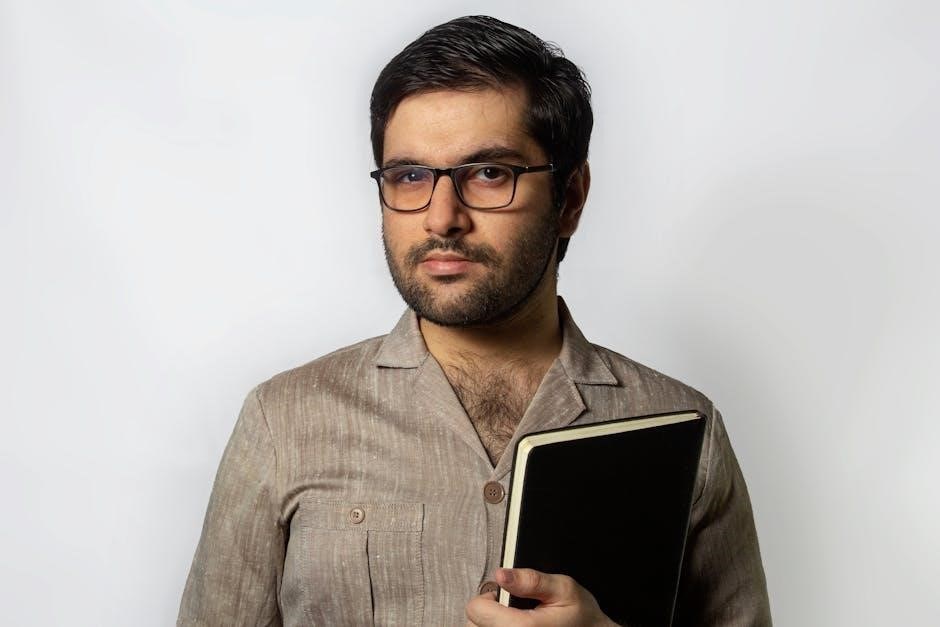Act 3 of The Crucible intensifies the witch trial hysteria, showcasing the courtroom’s rising tension. Themes of guilt, deception, and false accusations dominate, escalating the dramatic conflict.

1.1 Overview of the Act’s Setting and Context
Act 3 of The Crucible unfolds in a tense courtroom in Salem Village, where the witch trials reach a fever pitch. The setting is dominated by fear, hysteria, and rigid societal expectations. The courtroom becomes a symbol of power and manipulation, with Judge Danforth and the court officials exerting control over the accused. The atmosphere is charged with suspicion and paranoia, as the trials escalate and the community’s moral fabric begins to unravel under the weight of false accusations and fear-driven decisions.
1.2 Key Themes Emerging in Act 3
Act 3 of The Crucible explores themes of guilt, hysteria, and fear, as the witch trials escalate. The act highlights the destructive power of false accusations and the moral corruption of the court. Themes of truth vs. deception and personal redemption also emerge, particularly through John Proctor’s struggle with his past mistakes. The courtroom setting amplifies the tension, revealing how fear and manipulation can override justice, leading to devastating consequences for the accused and the community.

Main Themes in Act 3
Act 3 delves into themes of guilt, hysteria, and fear, emphasizing the destructive impact of false accusations and the blurred lines between truth and deception.
2.1 Guilt and Redemption
Guilt and redemption are central in Act 3, as characters confront their past mistakes. John Proctor, burdened by his affair with Abigail, seeks redemption by defending his wife and challenging the court’s corruption. His honesty, however, is met with skepticism, deepening his internal struggle. Mary Warren’s guilt over her false accusations surfaces, leading to her breakdown, while Elizabeth’s silent strength highlights her own moral resilience. The theme underscores the destructive power of unchecked guilt and the elusive nature of redemption in a society consumed by fear and deception.

2.2 The Dangers of Hysteria and False Accusations
Act 3 vividly portrays the destructive power of hysteria and false accusations. The courtroom becomes a chaotic arena where fear and manipulation reign, fueled by the girls’ fabricated claims. Abigail’s influence amplifies the hysteria, leading to unjust condemnations. Mary Warren’s initial complicity and later breakdown highlight the psychological toll of such deceit. The act underscores how unchecked emotions and false testimony can dismantle societal trust, leading to devastating consequences for the accused and the community as a whole.
2.3 The Conflict Between Truth and Deception
Act 3 reveals the stark conflict between truth and deception, as characters grapple with moral integrity. John Proctor’s honesty clashes with the court’s refusal to acknowledge reality, while Abigail’s lies dominate. Mary Warren’s testimony exemplifies the fragility of truth when fear and manipulation prevail. The court’s distrust of honest confessions highlights the destructive power of deception, ultimately leading to tragic consequences. This conflict underscores the moral and ethical dilemmas central to the play’s themes of justice and integrity.
Key Characters in Act 3
Act 3 focuses on John Proctor, Mary Warren, and Judge Danforth, whose actions and decisions drive the plot’s tension, revealing their moral struggles and motivations.

3.1 John Proctor: His Dilemma and Decisions
John Proctor faces a moral crisis in Act 3, torn between his guilt over the affair with Abigail and his desire to protect his wife, Elizabeth. His decision to confess his infidelity publicly aims to expose Abigail’s deception but risks his reputation and life. Proctor’s internal struggle reflects his effort to redeem himself, even as the court’s distrust and the community’s hysteria threaten to destroy him. His choices highlight the conflict between personal integrity and societal judgment.
3.2 Mary Warren: Her Role in the Courtroom

Mary Warren’s role in Act 3 is pivotal as she becomes a key witness in the trials. Initially, she supports the accusers, but her conscience burdens her. During the courtroom drama, Mary’s testimony falters, revealing her internal conflict. Her breakdown under pressure exposes the fraudulence of the accusations, yet her credibility is questioned. Mary’s inability to uphold her false claims highlights the fragility of the trials’ foundation, making her a complex and conflicted figure in the escalating hysteria.
3.3 Judge Danforth: His Perception of the Trials
Judge Danforth views the trials as a necessary purge of evil, believing the court’s authority is divine. He sees himself as a defender of order and religion, unwilling to question the girls’ accusations. Danforth’s rigid belief in the trials’ legitimacy blinds him to the truth, making him resistant to evidence of fraud. His perception is rooted in maintaining societal control, leading him to dismiss dissent and uphold the trials’ proceedings, despite growing doubts and mounting hysteria.

Significant Scenes in Act 3
Act 3 features pivotal moments like the courtroom confrontation, Mary Warren’s breakdown, and Martha Corey’s examination, highlighting the escalating hysteria and injustice of the trials.

4.1 The Courtroom Confrontation
The courtroom confrontation in Act 3 reaches a fever pitch as John Proctor faces the judges, denying witchcraft accusations. Tensions rise with Proctor’s confession of his affair with Abigail, attempting to discredit her credibility. However, Elizabeth’s cautious testimony undermines his effort, leading to further distrust. This scene underscores the destructive power of hysteria and the court’s refusal to accept truth, propelling the trials toward tragic consequences.
4.2 Mary Warren’s Breakdown
Mary Warren’s breakdown in Act 3 highlights her vulnerability and fear. As a servant and witness, she initially supports the accusers but later tries to recant her testimony. Under intense pressure from Abigail and the court, Mary crumbles, unable to withstand the scrutiny. Her breakdown reveals the psychological toll of the trials and the manipulation by others. This moment underscores the fragility of truth in a climate dominated by hysteria and false accusations, further entrenching the chaos in Salem.
4.3 The Examination of Martha Corey
In Act 3, Martha Corey’s examination reveals the court’s relentless pursuit of convictions. Judges Hathorne and Danforth interrogate her, dismissing her denial of witchcraft. When Francis Nurse presents evidence of the girls’ fraud, the court refuses to consider it, prioritizing fear over truth. Martha’s steadfast refusal to confess further isolates her, showcasing the court’s refusal to acknowledge reality. This scene underscores the destructive power of unchecked hysteria and the erosion of justice in Salem.

Character Analysis and Development
Act 3 delves into the complexities of John Proctor, Abigail Williams, and Mary Warren, exploring their moral struggles, manipulative tactics, and emotional breakdowns amid the trials.
5.1 John Proctor’s Internal Struggle
John Proctor grapples with guilt over his affair with Abigail, torn between honesty and protecting his reputation. His internal conflict escalates as he faces the court, where admitting the truth could doom him. Despite his flaws, Proctor’s desire to maintain his integrity drives his decisions, ultimately leading to a tragic yet noble sacrifice. His struggle reflects the play’s themes of morality, redemption, and the consequences of past mistakes.
5.2 Abigail Williams’ Manipulation
Abigail Williams masterfully manipulates the court and others through false accusations and emotional appeals; She uses her charm and feigned piety to control the narrative, turning the trials into a tool for revenge. Her ability to sway the crowd and the judges highlights her cunning and ruthlessness. Abigail’s manipulation escalates the hysteria, leading to further chaos and unjust outcomes, while her motivations remain deeply personal, driven by her vendetta against Elizabeth Proctor.
5.3 Elizabeth Proctor’s Silence and Strength
Elizabeth Proctor’s silence in Act 3 reflects her unwavering integrity and moral strength. Despite the chaos, she remains composed, choosing not to speak ill of others, even when faced with injustice. Her silence is a testament to her dignity and refusal to engage in the hysteria. This quiet resilience contrasts sharply with the turmoil around her, showcasing her as a symbol of truth and integrity amidst the deception and fear that dominate the trials.

Critical Thinking Questions
- How does fear drive the trials’ progression in Act 3?
- Why does Danforth dismiss Proctor’s confession?
- What impact does Mary’s testimony have?
6.1 Why Does Danforth Refuse to Believe John Proctor?
Danforth refuses to believe John Proctor because he is deeply committed to maintaining the court’s authority and legitimacy. He views Proctor’s confession as an attempt to undermine the legal process and destabilize the community. Danforth’s rigid belief in the court’s infallibility, coupled with the widespread hysteria, makes him resistant to questioning Abigail’s credibility. Additionally, Proctor’s admission of adultery damages his reputation, leading Danforth to distrust his motives. The Deputy Governor prioritizes order and the appearance of justice over potentially exonerating evidence.
6.2 How Does Mary Warren’s Testimony Impact the Trials?
Mary Warren’s testimony introduces significant doubt into the trials, as she admits her accusations were false. Her recantation undermines the credibility of the other accusers, creating chaos in the courtroom. However, the court dismisses her confession, labeling her as manipulative and unreliable. This rejection highlights the rigid mindset of the judges, who prioritize maintaining order over uncovering truth. Mary’s breakdown further escalates the tension, showcasing the moral and emotional complexity of the situation.
6.3 What Role Does Fear Play in Act 3?
Fear permeates Act 3, driving the hysteria and paranoia that fuel the witch trials. The community’s fear of retribution and accusation creates a toxic atmosphere, silencing rational voices. Mary Warren’s breakdown and John Proctor’s confession highlight how fear manipulates truth. The court’s refusal to believe Proctor underscores the fear of challenging the trials’ legitimacy. Ultimately, fear escalates the trials’ momentum, preventing justice and fostering chaos, as individuals prioritize survival over morality.